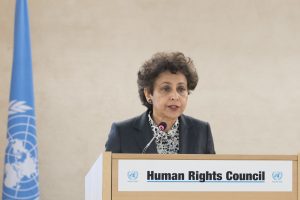The initial report of United Nations Special Rapporteur on freedom of opinion and expression Irene Khan after her recent 10-day official visit to the Philippines has drawn mixed reactions from government officials and various stakeholders.
Khan was the third U.N. special rapporteur to visit the country since Ferdinand “Bongbong” Marcos Jr. became president in June 2022, which authorities have claimed as proof of the willingness of the new government to engage with the U.N. and the international community to address human rights concerns.
The Philippines’ human rights situation was put under global spotlight during the presidency of Rodrigo Duterte, who waged a brutal “war on drugs” and was accused of weaponizing laws and judicial processes to silence the media and critics.
The Marcos government has invited Khan to witness the reforms implemented over the past year and to confirm that the country has a “vibrant” media sector.
Indeed, Khan acknowledged that the Marcos government “has set a welcome, new tone on many issues that were of concern in the recent past,” but also noted that these reforms are “not sufficient to turn the page decisively on the past.”
During her stay in the country, Khan visited 24 government agencies and met with over 10 members of the House of Representatives, and seven members of the Supreme Court. She also held consultations with civil society groups, members of the media and academe, local officials, and two journalists detained in a provincial jail.
Khan’s report made several observations and recommendations on improving protection for free speech. She mentioned how red-tagging and terror-tagging are used “to target legitimate activists and activities.”
“The vilification has often been followed by threats, unlawful surveillance, attacks, or even unlawful killing. It intimidates and chills freedom of expression, and suppresses legitimate activism, journalism, debate and criticism which are part and parcel of freedom of expression,” she said during a press conference.
She urged the Marcos government to issue an order denouncing red-tagging and implement a firm policy on this. She also recommended the abolition of the National Task Force to End Local Communist Armed Conflict (NTF-ELCAC) to make the government’s peace program more consistent.
“The abolition will both address some critical drivers of ‘red-tagging’ but will also allow this administration to modernize peacebuilding approaches based on a changing political landscape. The abolition will allow for more all-inclusive peace-making platforms,” she said.
The NTF-ELCAC, which was established during the Duterte presidency, became notorious for linking numerous activists and critics with the armed communist movement. It is the main government entity identified by human rights defenders for promoting the practice of red-tagging in the bureaucracy and various social institutions in the country.
Khan was the second U.N. special rapporteur to propose the abolition of NTF-ELCAC. Ian Fry, the first U.N. special rapporteur on the promotion and protection of human rights in the context of climate change, made a similar conclusion when he visited the Philippines in November.
The Commission on Human Rights welcomed Khan’s recommendations as it affirmed the dangers of red-tagging. “We must remain mindful that red-tagging is a human rights violation on its own and may lead to a multiplicity of other acts of violence which put the welfare of the general public at risk,” it said in a statement.
But NTF-ELCAC has strongly rejected Khan’s suggestion for its abolition. In a media interview, an official of NTF-ELCAC issued this statement: “We will not allow any outsider to dictate us how to fight our wars and to dictate upon us the means to win the peace for our people. We have managed to succeed in our fight against insurgency and terrorism as a nation and as a people. This is something that cannot be hijacked nor be undermined by anyone.”
Senator Imee Marcos, the president’s sister, described Khan as a “threatening foreigner” and Khan’s report as “supremely presumptuous.”
A more sober and rational response was given by the presidential communications office, which assured Khan that “these suggestions will be thoroughly evaluated and considered for implementation, serving as a foundation for transformative measures.”
It added that Khan’s visit was too brief for her to make a comprehensive assessment of the country’s situation. “While the government is open to reforms, it points out the difficulties in fully grasping the local nuances within a brief ten-day visit,” the office said in a statement.
Khan will submit her full report to the U.N. in June 2025 which gives the government and other stakeholders enough time to evaluate the initial recommendations and to work on substantially improving the country’s state of freedom of expression.

































